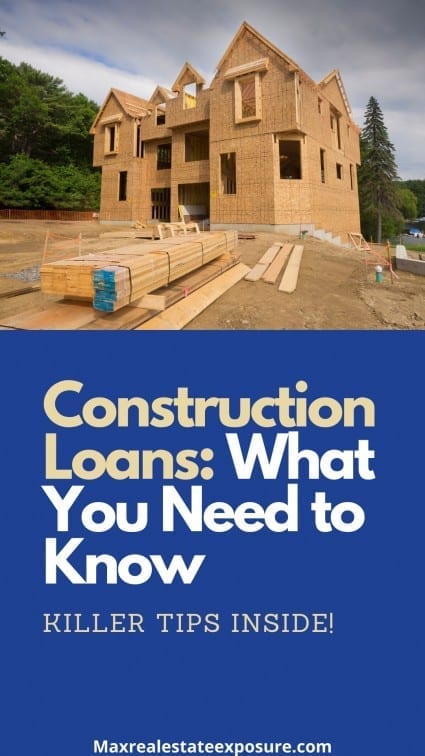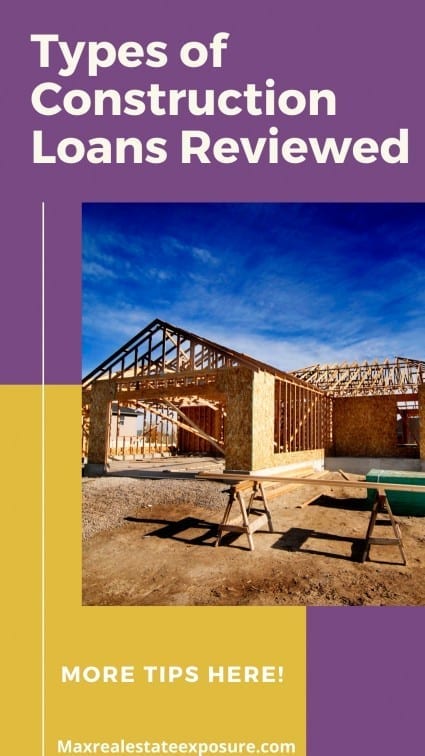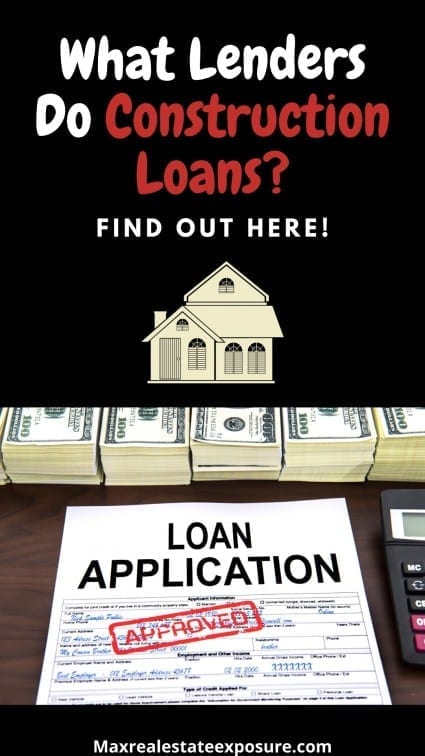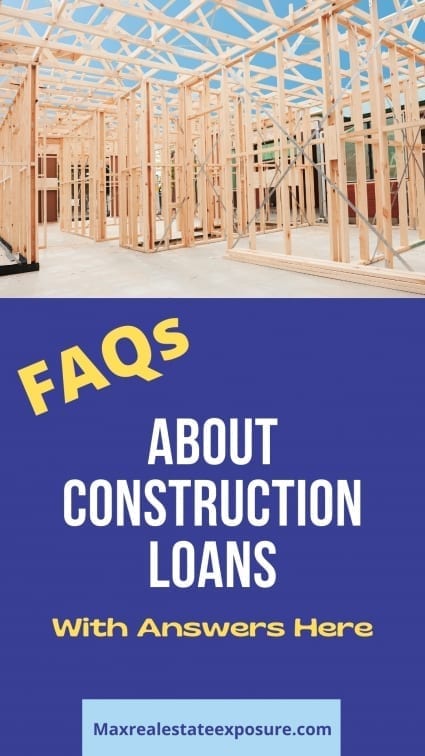 Are you considering getting a home construction loan? Do you want to know how a construction loan works?
Are you considering getting a home construction loan? Do you want to know how a construction loan works?
Construction loans are popular options when one owns the land and wants to build a custom home.
When building your own house, you will likely need a construction loan.
If you have ever gotten a mortgage, you know how complex the loan application process can be.
Getting a construction loan is even more complicated than getting a mortgage. Many people are approved for construction loans, so if you are prepared, you can certainly succeed.
Often, those taking out a home loan to build have previously purchased land, probably intending to build their own homes. They either used a land loan or purchased the property outright.
As a real estate agent who has gone through two real estate recessions, another situation where home builder loans become common is when it is a severe buyer’s market.
In such times, a builder may not readily procure home financing. They often ask the potential buyer to take out the construction loan instead.
I have built two homes from scratch by taking out my construction loan. From many years of experience as a real estate agent, I know there is much to learn about these mortgages.
The following information will give you a basic understanding of how construction loans work. You can use this knowledge to start down the path to getting your building loan if it makes sense for you.
Let’s look at everything you need about home construction loans. There are several types of house-building loans you may want to consider.
What is a Construction Loan?
A construction loan is a short-term mortgage specifically designed to finance the construction of a new home or building. Unlike a traditional mortgage loan, which is used to purchase an already-built property, a construction loan provides funding to cover the costs of the construction process.
The loan is typically disbursed in stages or “draws” as the construction progresses, and the borrower only pays interest on the amount that has been disbursed. Once the construction is complete, the borrower can pay off the loan in full or convert it into a traditional mortgage loan.
A construction loan works by rolling over into a permanent loan once a home has been completed. The maximum loan-to-value ratio for most construction loans is 80%.
What Are The Mortgage Rates?
A construction loan typically has a variable interest tied to the prime rate. Introductory rates you receive from mortgage lenders usually depend on your credit score and financing history.
The construction loan rate you pay will be higher than traditional mortgages.
Financial Requirements For These Loans
- Most lenders will require a credit score of 620 or higher to qualify.
- Your debt-to-income ratio can usually be no higher than 45%.
- Most lenders require a 20 percent down payment with a traditional construction loan.
- Your credit history is vital to construction loan lenders. A homebuyer will get better offers with their approval with solid finances.
Construction Loan vs. Traditional Mortgage
A new construction loan differs from a traditional mortgage because it is short-term. Unlike conventional mortgages, which usually last 10-30 years, most construction loans are not longer than a year.
Construction loans are paid over a series of “draws” until the home is complete, whereas a borrower gets all the money with a traditional mortgage. With a regular mortgage, all the payments start immediately, including principal and interest.
With construction loans, you’ll only be paying interest on your loan until the house is completed. A construction loan will have higher interest rates because they are riskier for lenders.
Let’s look at these conditions more closely.
1. Short-term With Higher Interest Than Standard Mortgages.
A construction loan is designed to fund the construction of a residential property. The goal is to deliver the right amount of money a builder needs to complete the project when required. Once construction is complete, the loan must be paid in full.
These loans are only offered over a short term – as long as it takes to complete the project – and charge a higher interest rate than a conventional mortgage. Lenders charge a higher rate for home-building loans because more risk is involved.
With a traditional mortgage loan, lenders use your home as collateral. They can seize and sell the house if you default on the loan.
If you default on a construction loan, there may be no property to seize if the project is not completed. A construction mortgage is considered a short-term loan.
When getting a house-building loan, you will often need a down payment of at least twenty percent. The loan will only have a higher rate during construction; once the house is built, it will become a permanent loan.
2. Paid Out in Disbursement Stages.
Many people fail to realize that loans for construction work are financed in stages. You get a single lump sum from the lender with a personal loan when the loan is approved. But with a construction loan, the lender pays you in stages as construction advances.
One thing that makes these building loans more complicated is the requirement to map out the construction costs ahead of time and estimate how much money will be needed and when for each stage.
Typically, the lender will dictate the schedule for releasing the money. You will know how this schedule is set up ahead of time.
For example, the bank or lender may release funds when the foundation is installed and backfilled. This would be considered the first release or first draw of funds.
For example, the second release may come when the home is completely framed. You would then get a second draw from the lender.
These draws come at each primary construction phase until the project is completed. Most people will pay their installments from checking accounts.
Separate business checking accounts are great for these home loans.
How Do They Work (Video)
See a quick video explanation about home building loans and how they work.
3. You Usually Only Have to Pay Interest For Each Building Stage
The staggering of payments on construction loans usually means you only need to pay interest on the money delivered thus far.
You will have to plan to pay the loan at the end of construction in total, but until construction is completed, you will only need to worry about the interest due at the stage you are currently at.
One of the nice perks of loans for new construction is that you are not hit with high interest costs until the very end, when the project is nearing completion.
4. You Must Have Plans For The Project
 When getting a house loan to build, you can’t just provide your financial details like you can with a mortgage.
When getting a house loan to build, you can’t just provide your financial details like you can with a mortgage.
To qualify, you need quite a bit more, including a builder’s contract laying out the draw schedule for the funds, detailed plans on the project, and a construction timetable.
You will not be able to get away with just a floor plan but a detailed set of construction plans.
The budget must be realistic for the type of property you are building. Getting this information requires working with a builder to produce the necessary documentation.
Expect to spend time gathering everything you need to qualify.
Before committing to build a custom home, you should always ask the builder many questions beforehand. Many of the questions will center around the builder’s qualifications and reputation.
It is vital to thoroughly interview a builder before choosing one.
Getting cost estimates from at least three builders before selecting one is highly recommended.
5. The Lender Will Check on Your Project Periodically.
Lenders face higher risk with new home construction loans, so they tend to be more careful about overseeing their investment. You can expect a lender representative to show up at your worksite periodically, especially when a new round of funding is supposed to be delivered.
Not that the representative is an inspector for the quality of the work, but they ensure the stage of construction is complete before they release the next round of funds to you.
When people ask “how to get a construction loan,” this is a crucial point to go over with them.
6. The Building Loan Will Only Pay For Construction Costs.
If you get construction financing, you can only use that loan to pay for construction-related costs like materials, labor, and permits.
You can’t use the loan to pay for furnishings or other items that can be removed from the property.
7. What Documents Will You Need to Provide The Lender?
These are the requirements for construction loans. They will be different than other mortgage loans.
Just like when you procure financing for purchasing a traditional loan, there are several documents you’ll need to provide the lender to get a mortgage. The resource covers the financial information you’ll need to disclose, but the lending institution will also require the following as well:
- A building contract between yourself and the builder or contractor (if applicable).
- Copy of the builders/contractor’s license.
- A set of blueprints of the house you are building.
- Detailed specifications on how the home is being built – things like the type of heating, plumbing, electrical, kitchen, baths, etc.
- Any quotes outside the building contract, such as swimming pools, sheds, landscaping, etc.
- The lender will require a land survey if you purchase land as part of the construction loan. You might have an acre of land or 5 acres. The lender will want precisely exactly what they are lending.
- A breakdown of the cost of construction.
As part of approving your construction loan request, the lender will do a home appraisal to ensure the market value. Like any other mortgage, the lender wants to make sure they are lending on the appropriate amount.
All of these things are part of the construction loan process.
8. The Builder Will Also Want a Deposit
An essential point to consider when building a custom home is that the builder will probably want an upfront deposit of ten percent.
Unlike a resale home, where the earnest money is in a third party’s account, the builder will want to use the deposit.
In more challenging economic times, asking the builder for a second mortgage against the deposit is not unusual to protect from losing funds.
Speaking with a real estate attorney to get this set up correctly would be advisable.
Different Types of Building Loans
There are a few different types of house-building loans. Let’s take a look at each of the types of construction loans you may encounter:
1. Construction to Permanent Loan
 If you plan on building a home and then moving into that home, a construction to permanent loan is probably what you will choose.
If you plan on building a home and then moving into that home, a construction to permanent loan is probably what you will choose.
It combines a home-building loan with a mortgage in one single package. You start with a construction loan to fund the home’s building and end with a mortgage after moving in.
The biggest reason to go with a construction to permanent loan is to minimize the fees you pay for your loan.
You will only pay closing costs once on this type of loan. If you were to get a construction loan and then go to get a mortgage, you would pay fees twice.
The construction-to-permanent loan is the best option to avoid having separate loans. This is the most common type of home-building loan.
When purchasing a resale home, you’ll want to vet the lender before choosing someone. In this circumstance, you’ll want to select a financial institution specializing in construction lending.
2. Construction-only Loan
Not everyone needs or wants a mortgage. Even if they want a mortgage, they may decide that they have a reason to get a loan for construction from one lender and a mortgage from another.
There is a construction-only loan for those who want a loan to construct their home. This is also referred to as a stand-alone construction loan.
It’s important to note that these loans must be paid in full when the project is complete. Whether you use cash or get a mortgage, you must pay the loan off when your home is fully built.
Usually, these types of loans are not the best option. Most of the time, there isn’t a good enough reason to get a new loan from another lender.
Interest Rates Will Be Based on The Prime Rate
With a construction loan for a new home, you will be given an interest rate based on the prime rate plus a margin. The rate can change during the loan term, depending on when the prime rate changes.
You will get the money in stages based on the progress of your construction project. Each step you reach that was agreed upon during the loan application will result in another round of funding.
Getting a construction loan and worrying about a mortgage later when the project is completed may seem tempting. You should be aware that going this route will usually be more costly.
If you get a different mortgage from the building loan, you will have to pay the fees associated with the loan twice.
Another problem with waiting until you finish the build is that if your financial situation worsens, you could find that your mortgage options have diminished or disappeared altogether.
If you are in good financial shape right now, getting a construction to permanent loan is a better idea to ensure you have all the money you need.
3. Renovation Loans
Renovations are another type of construction that often requires obtaining a loan. These mortgages are sometimes referred to as renovation loans or home improvement loans.
These are usually smaller loans than for new home-building projects and can come in various forms. One individual may only need $10,000 to complete a renovation project, while another might need $50,000.
How a lender meets a borrower’s needs can vary depending on the size of the loan and the borrower’s financial situation.
There are a few common ways that homeowners get renovation loans, including home equity lines of credit (HELOC) and unsecured personal loans. Some may decide to use credit cards. Each of these has advantages and disadvantages.
Home equity loans are rarely used as options for finance.
One thing to remember about renovation loans is that there is far less oversight from the lender. In most cases, the homeowner is the one overseeing the renovation project. They will get the loan and then write the check to the contractor. The lender may not be involved at all.
If you are considering a renovation loan, do your due diligence to find a trustworthy contractor. Look for contractors with the right qualifications, insurance, licenses, etc. Ideally, find one that has plenty of recommendations you can verify personally.
You can find someone to do good work – it’s just important to be careful because whether they do things right or not, you will still have to pay the loan off.
A renovation loan may be the perfect type of mortgage when you are improving your property.Click To Tweet4. Owner-Builder Loans
An owner-builder loan is a construction-only loan for borrowers building the property themselves. Not just anyone can qualify for owner-builder loans. You will probably only be able to get a loan like this if you are a licensed builder with plenty of experience.
Many lending institutions are suspicious of owner-builder construction loans because they find it risky to lend money to anyone who isn’t a licensed general contractor with an established reputation for quality.
There are so many things involved in building a home – so many things can go wrong – that it is just too big of a risk for a lender to loan money to an unlicensed or inexperienced home builder.
An owner-builder loan is typical when a prominent developer is building subdivision houses.
5. USDA Construction Loans
USDA construction loans are mortgages guaranteed by the U.S. Department of Agriculture. They are specifically for new homes built in rural areas. They allow borrowers to finance a new home build.
A construction loan with the USDA is challenging to find. Not many lenders offer them.
6. VA Construction Loan
As you might have guessed, a VA loan for construction is for military members who wish to custom-build a home. Like traditional VA loans, they offer no down payment requirements.
You also won’t be required to pay private mortgage insurance like other loans. To use this loan, the builder must be VA-approved. There will also be a VA construction loan inspection requirement.
7. FHA Loan For Construction
There are two types of FHA construction loans: the FHA construction-to-permanent loan and the FHA 203k rehab loan. The FHA construction loan is like others because it allows you to purchase land, build a house, and roll all the costs into one loan.
FHA loans for construction have the same advantages as traditional FHA financing, including a low down payment requirement of 3.5% and a relaxed credit score requirement.
8. End Loans
You may have heard about the term-end loan. An end loan is the same as a mortgage; it’s just another term for a loan taken out at the end of a construction project.
There are numerous permanent loans with different amortization schedules to choose from. You should pick the length of your mortgage ahead of time.
Lenders today are much more flexible than they used to be in years past. For example, you might want to have your loan amortized over a period different from the traditional fifteen or thirty-year mortgage period.
Loan terms can be chosen just like you would with a conventional mortgage. You will want to speak to the financial institution you’re working with upfront on your desired loan term.
Who Does The Loans?
 You may be wondering who the significant lenders providing new construction loans are. The best mortgage lenders can vary from year to year, but these institutions have excellent reputations.
You may be wondering who the significant lenders providing new construction loans are. The best mortgage lenders can vary from year to year, but these institutions have excellent reputations.
Some of the national banks that do construction mortgages are the following:
- Wells Fargo
- US Bank
- Homebridge
- Prime Lending
- Northpointe Bank
- TD Bank
- First National Bank
While these lenders are some of the more recognized in the industry, you might be better off with a local lender. You may find an excellent local credit union that provides home-building financing.
Credit unions can sometimes offer more flexibility than larger national lenders can.
When getting a new house loan, you should always check with local builders and real estate agents to see who is doing them.
You might find a better deal than one of the larger institutions. These are all excellent companies that can help you reach your goals.
Remember, the banking guidelines may differ slightly when you finance with these construction loan lenders.
Make sure you look for excellent reviews before making an application.
Use a Loan Calculator For Qualifications
Do you know how much of a construction mortgage you can qualify for? Speaking to a building loan specialist will be essential.
However, you can use this construction loan calculator to understand how much of a mortgage you can carry.
Use the calculator to quickly determine what type of loan you may qualify for and the anticipated monthly payments on an initial interest-only loan.
The loan calculator also lets you calculate the conversion of the loan from construction to a traditional conforming mortgage, which amortizes and determines the monthly principal and interest payments on that portion of the mortgage.
It is vital to note that lenders will look for all borrowers to have a good credit score and an income ratio that makes them comfortable lending the money.
Plan For Additional Costs With Loans For New Home Construction
From experience, one of the best tips I can give you about getting a loan to build your dream home is there will undoubtedly be cost overruns. Indeed, you will see things you want that will cost more money than you thought.
Many finishes you choose, such as flooring and appliances, will not happen. It is easy to get carried away by seeing the latest and most extraordinary refrigerator you must have.
The problem is that it costs two thousand dollars more than you budgeted. If this happens several times, it is easy to understand why people spend more than they plan to.
Other times, cost overruns can happen right up front. For example, developing land is often more expensive than initially anticipated. Depending on the scope, you might run into a ledge on the property that needs to be blasted – which can be very expensive.
If the lot is served by a septic system rather than a public sewer, this is another area where there could be unplanned expenses. The same goes for a property served by a well that can be expensive to drill. There will always be miscellaneous costs when building a home.
FAQs
 1. Is it Hard to Get a Home-Building loan?
1. Is it Hard to Get a Home-Building loan?
It is more challenging to get construction loans than traditional financing.
Getting loans for new construction is more complex because the lender is taking on additional risks. Before and during construction, the bank does not have a tangible asset.
You will need to have an excellent credit score.
2. How Can I Find Lenders That Offer These Real Estate Loans?
You can employ several effective strategies. Conduct thorough online research to identify reputable financial institutions specializing in construction financing.
Utilize search engines such as Google and visit websites that provide comprehensive information on loan options.
Additionally, consider contacting local banks and credit unions, as they often have specific programs tailored for construction projects.
Mortgage brokers can also be valuable because their services include finding the best loan partners for all types of home loans.
Networking with real estate professionals such as builders, contractors, and architects can also prove beneficial, as they may have valuable insights or connections to lenders experienced in providing construction loans.
Lastly, attending industry conferences and seminars related to construction financing can help you establish relationships with lenders involved in this sector.
Combining these approaches will increase your chances of finding suitable lenders for your construction project.
3. How Long Does it Take to Get Approved?
The approval process typically takes around 45 days when applying for a construction loan. This duration allows lenders to evaluate the borrower’s financial standing thoroughly, review the construction plans and budget, and assess the project’s feasibility.
During this time, the lender conducts a comprehensive analysis of the borrower’s credit history, income stability, and debt-to-income ratio to determine their eligibility for the loan.
They usually require an appraisal of the property and a detailed examination of the construction plans to ensure they align with local building codes and regulations.
Overall, this timeframe ensures that both parties have ample time to complete all necessary due diligence before proceeding with the loan.
4. How Does Approval For Disbursement Requests Work?
Draw requests play a crucial role in ensuring the smooth progress of a project. When borrowers need funds to cover construction expenses, they request a draw from the lender.
This request typically includes detailed documentation, such as invoices, receipts, and progress reports from the contractor. Upon receiving the draw request, the lender carefully reviews the documentation to verify that the work has been completed as stated and that it aligns with the agreed-upon budget.
Once approved, the lender disburses the funds directly to the borrower or sometimes to a designated escrow account. This process allows for transparency and accountability throughout the construction phase. It ensures that funds are allocated appropriately and in line with project milestones.
The final repayment timeline will depend on when you finish.
5. Are Interest Rates Higher Than Regular Mortgages?
Yes. The interest rate of building loans tends to be higher than the going interest rate for a regular home mortgage. It is not unusual to pay an interest rate one percent higher.
6. Who Sets The Interest Rates For These Loans?
A combination of factors typically sets the interest rates for construction loans. The lender’s internal policies and risk assessment play a significant role in determining the interest rate.
Market conditions and economic indicators such as inflation rates, prime lending rates, and the overall demand for construction loans also influence interest rates.
Lastly, central banks’ government regulations and monetary policies can indirectly impact construction loan rates. Therefore, a complex interplay of various factors determines the interest rates for construction loans.
7. What Will a New Home Loan Cover?
Construction loans can cover numerous expenses, including purchasing the land, building permits, building materials, permanent fixtures, construction labor, paying the builder, and more.
Once the project is complete, you will then have permanent financing.
8. Can These Loans For New Homes Include Land?
Yes, with a building loan, your total mortgage can include the cost of the land and the cost of building the property.
9. Can You Get an FHA Construction Loan?
Yes. The Federal Housing Administration (FHA) offers a house-building loan. Like a traditional FHA loan, you can put 3.5 percent down.
10. Can Interest be Deducted From Your Taxes?
Yes. You can deduct the interest on your construction loan if it is secured by the home you move into. A home under construction can qualify for up to 24 months, but only if it is your qualified home at the time of occupancy.
11. Can a New Construction Building Loan Have a Fixed Rate?
Yes. A construction loan will convert into a permanent mortgage after construction is completed. Like any other mortgage, you can choose the loan length and whether you want the interest rate to be fixed or adjustable.
12. When is a New Home Loan Needed?
If you own a piece of land and want a builder to construct the home, they may require you to take out the building loan. Some builders prefer to have the owner of the land finance the project.
The builder gets paid on a contract basis, typically with a percentage of the cost to build as their profit.
13. Can You Get a Building Loan For a Modular Home?
Yes, you can get a construction loan for modular housing. You might even be able to get construction loan financing for a shipping container home as well, although it will be more challenging.
Fewer lenders are granting mortgages for shipping container housing. As they grow in popularity, that could change.
14. How is The Finished Value of The Property Determined?
An appraiser is typically hired to assess the property’s market value based on its location, size, and overall condition. Additionally, the appraiser considers the quality of materials used during construction, the craftsmanship involved, and any unique features or amenities that may enhance the property’s desirability.
Furthermore, the appraiser considers the current real estate market trends and comparable sales in the area to ensure an accurate valuation.
This comprehensive evaluation ensures that the value assigned to the finished property aligns with its actual market worth, providing a solid foundation for securing a construction loan.
15. When Can You Move Into The House With These Loans?
With construction loan financing, you can not move into a home until the city or town has granted an occupancy permit. It will also depend on the construction timeline.
Final Thoughts
Hopefully, you now better understand how a new home loan works. Construction financing isn’t rocket science but requires much more planning than a traditional mortgage.
Hopefully, the tips provided on procuring building loan financing have been helpful.
You should have a much better understanding of getting this type of mortgage. Ensure you have a qualified builder, and keep in the back of your head that there will probably be unexpected costs you didn’t plan for.
Understanding how to get a construction loan should be much more precise now.
More Exceptional Mortgage Resources
Get more valuable mortgage advice in these articles from Maximum Real Estate Exposure.
- Who can give a down payment gift? Did you know lenders will let you receive down payment gift money from various sources when purchasing a home? This article provides a complete overview of what you need to know about down payment gifts.
- Questions a lender will ask – when you are applying for mortgage financing, there are things a lender will ask that you should be prepared to answer. See what you need to know.
About the Author: Bill Gassett, a nationally recognized leader in his field, provided the above real estate information on construction loans and how they work. He is an expert in mortgages, financing, moving, home improvement, and general real estate.
Learn more about Bill Gassett and the publications he has been featured in. Bill can be reached via email at billgassett@remaxexec.com or by phone at 508-625-0191. Bill has helped people move in and out of Metrowest towns for the last 38+ years.
Are you thinking of selling your home? I am passionate about real estate and love sharing my marketing expertise!
I service Real Estate Sales in the following Metrowest MA towns: Ashland, Bellingham, Douglas, Framingham, Franklin, Grafton, Holliston, Hopkinton, Hopedale, Medway, Mendon, Milford, Millbury, Millville, Natick, Northborough, Northbridge, Shrewsbury, Southborough, Sutton, Wayland, Westborough, Whitinsville, Worcester, Upton, and Uxbridge MA.


 1. Is it Hard to Get a Home-Building loan?
1. Is it Hard to Get a Home-Building loan?